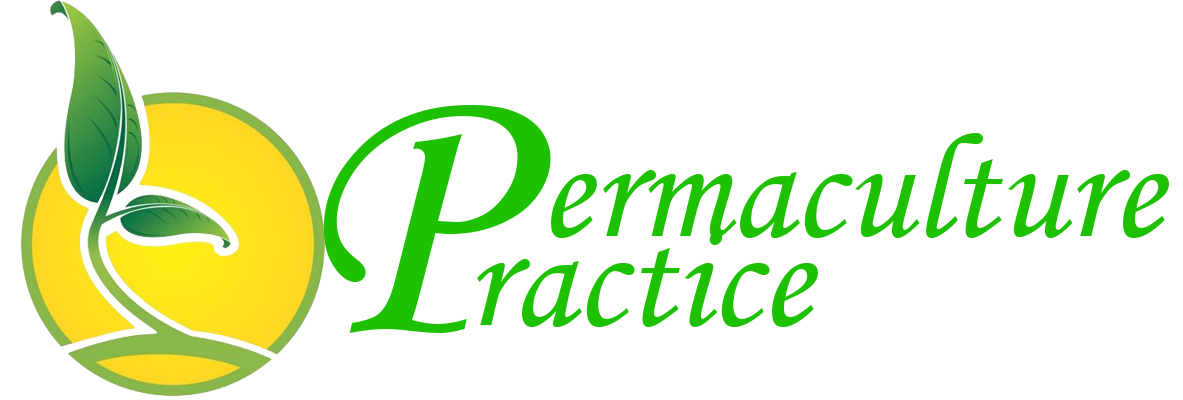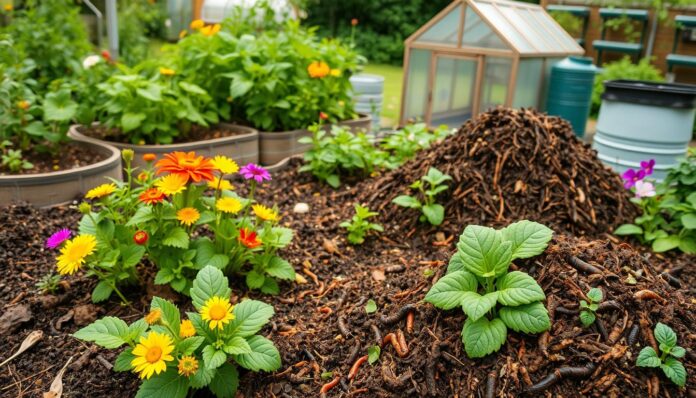What if waste was not a problem, but an opportunity for growth and positive change? Permaculture teaches us to see challenges as chances for growth and positive change. It opens up new solutions that help our communities and the planet now and in the future. By applying permaculture principles, we can turn waste into valuable resources. This reduces the environmental impact of waste disposal through sustainable waste management and permaculture waste transformation.
Permaculture is a holistic design system that aims to create sustainable and regenerative systems. The permaculture approach to waste transformation involves designing systems that mimic nature. In these systems, waste is seen as a resource rather than a problem. This approach has the potential to revolutionize the way we manage waste. It creates a more sustainable future for generations to come through permaculture waste transformation and sustainable waste management.
Key Takeaways
- Permaculture principles can turn waste into valuable resources, reducing environmental impact through sustainable waste management.
- Implementing composting methods can reduce organic waste by up to 50% and transform it into nutrient-rich soil amendments.
- Permaculture waste transformation involves designing systems that mimic nature, where waste is seen as a resource rather than a problem.
- By adopting holistic waste management strategies, farmers can aim for a zero-waste system, reducing landfill contributions by over 60%.
- Utilizing renewable energy sources and efficient irrigation systems can decrease overall farm energy costs and improve water use efficiency through permaculture waste transformation and sustainable waste management.
- Permaculture emphasizes the importance of closed-loop systems and waste reduction in gardening practices, promoting sustainable waste management.
- Permaculture waste transformation has the potential to revolutionize the way we manage waste, creating a more sustainable future for generations to come.
Understanding Permaculture Principles
Permaculture is a design system that aims to create regenerative and self-sustaining ecosystems. It transforms surroundings into thriving environments that support biodiversity and ecological balance. This approach views waste as a resource, not a problem.
At the heart of permaculture are three core ethics: earth care, people care, and fair share. These ethics guide the design of permaculture systems. They ensure systems are sustainable, regenerative, and equitable. By embracing these principles, individuals can create systems that minimize waste and promote ecological health and resilience.
Core Values of Permaculture
- Earth care: promoting biodiversity and ecological balance
- People care: ensuring the well-being of individuals and communities
- Fair share: distributing resources in a just and equitable manner
By understanding and applying permaculture principles, individuals can create thriving ecosystems. This approach has the potential to transform our interaction with the environment. It promotes a more sustainable and regenerative future.
| Permaculture Principle | Ecological Benefit |
|---|---|
| Regenerative design | Promotes biodiversity and ecological balance |
| Ecological waste solutions | Minimizes waste and promotes ecological health |
The Importance of Waste Transformation
Waste transformation is key in permaculture. It helps lessen the harm waste disposal causes to the environment. By composting, people can turn organic waste into compost. This compost makes soil healthier and cuts down on the need for chemical fertilizers.
This method is good for the planet and can also boost local economies. Recycling waste can create jobs and help local businesses grow.
Organic waste recycling is a big part of waste transformation. It keeps waste out of landfills and cuts down on harmful emissions. By composting, homes can save money on waste disposal and make something valuable for their gardens.
Composting also makes soil better, helps it hold water, and supports many different species.
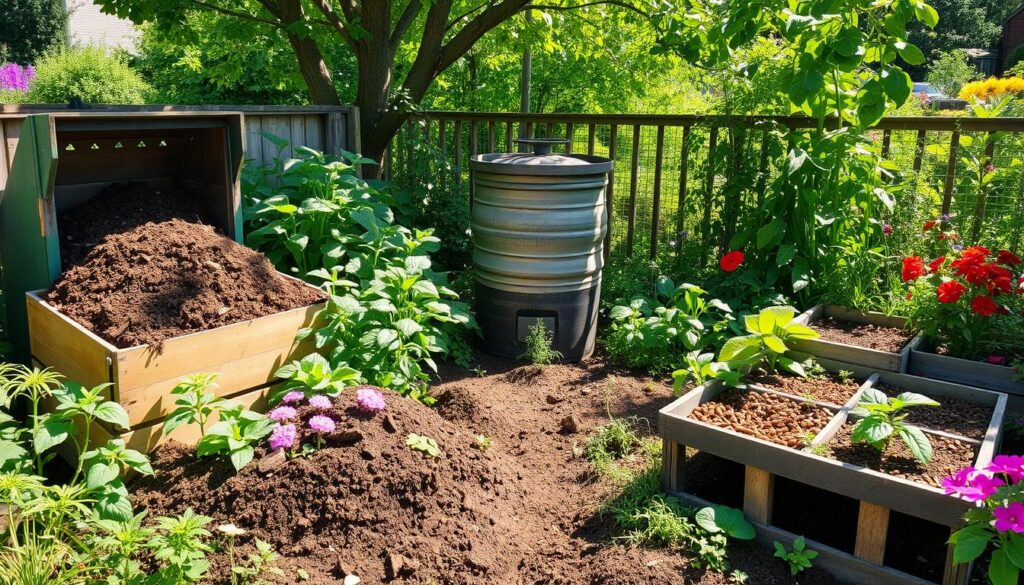
Some benefits of waste transformation include:
* Reduced environmental impact of waste disposal
* Economic benefits through job creation and local economic stimulation
* Improved soil health and reduced need for chemical fertilizers
* Increased biodiversity and ecosystem services
| Waste Transformation Method | Benefits |
|---|---|
| Composting | Reduces waste disposal costs, creates nutrient-rich compost, and improves soil health |
| Organic Waste Recycling | Diverts waste from landfills, reduces greenhouse gas emissions, and supports biodiversity |
By adopting waste transformation practices, individuals can help make the future more sustainable. Using composting and organic waste recycling, homes can make something valuable for their gardens. They also save money on waste disposal and help local economies grow.
Types of Waste in Permaculture
Permaculture sees different kinds of waste, key for making good waste systems. Knowing these types helps people use green waste reduction methods and set up biodiverse compost systems. The permaculture design says a healthy system has no waste. So, permaculture folks try to make systems that work like that.
There are several types of waste, including:
- Organic waste, like food scraps and yard trimmings, can be composted into rich soil.
- Inorganic waste, like plastics and metals, can be recycled and reused.
- Industrial waste, like chemicals and pollutants, needs special care and disposal.
By using green waste reduction methods and making biodiverse compost systems, people can cut down waste going to landfills. This helps make our environment more sustainable.
| Type of Waste | Description | Management Method |
|---|---|---|
| Organic | Food scraps, yard trimmings | Composting |
| Inorganic | Plastics, metals | Recycling, reuse |
| Industrial | Chemicals, pollutants | Special handling, disposal |
Techniques for Waste Transformation
Permaculture has many ways to change waste into something useful. These include composting, vermicomposting, and bokashi fermentation. They help manage waste in a way that’s good for the planet. You can use them in small gardens or big industrial settings.
Composting is a big part of permaculture waste transformation. It turns waste into soil that’s full of nutrients. This is like nature’s recycling, using food scraps and yard waste to make soil better.
Composting Methods
There are a few ways to compost. Hot composting is fast, using high temperatures to break down waste quickly. Cold composting is slower, adding waste to a pile and letting it break down over time.
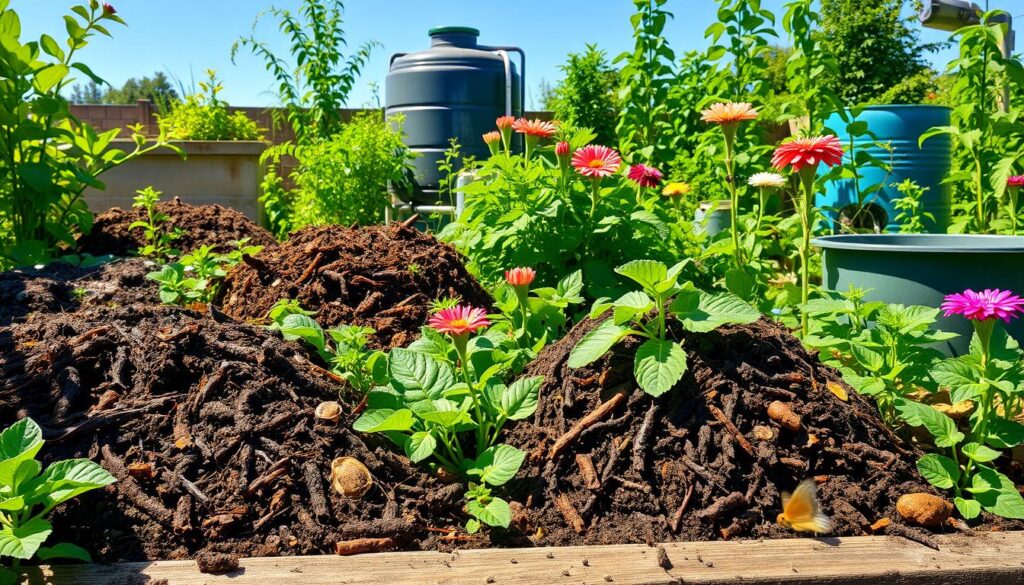
Vermiculture: Worm Composting
Vermicomposting uses worms to break down waste, making a nutrient-rich compost. It’s great for small-scale waste management and can be done indoors or outdoors.
Bokashi Fermentation
Bokashi fermentation uses microorganisms to break down waste, making a nutrient-rich liquid fertilizer. It’s easy to start and can compost food waste and other organic materials.
Using these permaculture waste transformation methods helps manage waste better. It also reduces our impact on the environment.
The Role of Soil Health in Permaculture
Soil health is key in permaculture. It affects the ecosystem’s health and productivity. By using regenerative design, we can create systems that work with nature. This boosts soil health and biodiversity.
Adding organic matter to soil improves its structure. It makes the soil more porous and helps roots grow. Soil with organic matter can hold 50% more moisture, helping plants grow better. Also, diverse farming systems can make farming more resilient to climate change by up to 25%.
Composting for Soil Enrichment
Composting is vital for enriching soil. It adds organic matter and nutrients. This turns waste into a valuable resource.
Soil Microbiology and Waste Breakdown
Soil microbiology is key for breaking down waste and recycling nutrients. A diverse microbial community makes soil more fertile. This leads to better farming and ecosystem services.
Utilizing Water Wisely
Water is very important in permaculture. We must use it carefully. By using composting techniques and organic waste recycling, we can save water. For instance, greywater recycling systems help a lot. They use water from sinks, showers, and washing machines.
Rainwater harvesting is also key. A 55-gallon rain barrel can water a 10×10 feet area of clay soil up to 5-8 inches deep. Rain gardens help manage water from homes and paved areas. They reduce runoff and prevent soil erosion.

Using water wisely in permaculture has many benefits. It:
* Reduces the need for fresh water
* Saves water for irrigation and other uses
* Helps prevent soil erosion and runoff
* Supports local biodiversity
| Water Conservation Method | Benefits |
|---|---|
| Rainwater Harvesting | Conserves water, reduces runoff, and supports local biodiversity |
| Greywater Recycling | Reduces the need for fresh water, conserves water for irrigation, and reduces soil erosion |
Creating a Closed-Loop System
Permaculture aims to create closed-loop systems. These systems aim to minimize waste and conserve resources. They use green waste reduction methods to make the most of what we have. This way, we can all help make the planet a greener place.
Creating a closed-loop system is possible with biodiverse compost systems. These systems turn organic waste into soil that’s full of nutrients. This not only cuts down on waste but also makes the soil healthier. It helps plants grow strong and diverse.
- Reduced waste and minimized environmental impact
- Conserved resources and optimized energy use
- Promoted biodiversity and ecosystem resilience
By going for a closed-loop system, we can do good for the planet. We also help ourselves and our communities stay healthy and strong.
Community Involvement in Waste Transformation
Permaculture waste transformation highlights the role of community in making waste management sustainable. It brings local people together to learn and act. This effort not only cuts down waste but also strengthens community bonds and encourages green living.
Community participation in permaculture waste transformation can be through educational workshops and collaborative projects. These activities let people learn and join in local efforts. Together, communities can build strong, green waste management systems that help everyone.
- Hosting community clean-up events and waste collection drives
- Setting up educational programs and workshops on green waste management
- Starting projects with local businesses and groups
Using these methods, communities can support green waste practices and improve the environment for all.
Permaculture waste transformation and green waste management are key to a better future. By teaming up and involving local folks, communities can positively affect the environment. They can also promote a healthier, greener lifestyle.
Case Studies in Successful Waste Transformation
Permaculture experts have made big changes in how we handle waste. They’ve worked in cities and countryside, using nature-friendly ways to cut down waste. For instance, urban projects like the Forest Gardens have turned small spaces into green oases. They use walls for gardens and collect rainwater.
In rural areas, like Zaytuna Farm in Australia, they mix animals, trees, and crops together. This method not only fixes the land but also grows food in a green way. Findhorn Ecovillage in Scotland has been doing this for over 50 years. They have gardens and use clean energy, making their place a true green haven.
Some key wins from these projects are:
- 70% of solid waste is organic, which can be turned into fertilizer
- They’ve cut food waste by half since 2019
- They’ve recycled all food waste, over 4,200 tonnes since 2009
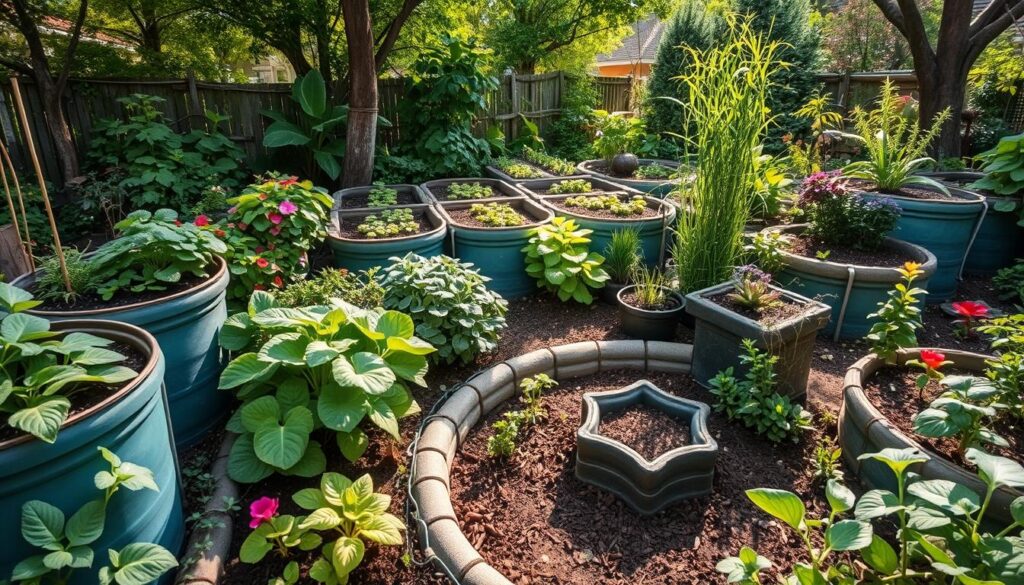
These examples show how permaculture can solve waste problems and make our world better. By using these methods, we can all help make our planet greener and more sustainable.
| Case Study | Location | Achievements |
|---|---|---|
| Forest Gardens project | Urban | Transformed limited urban spaces into productive environments |
| Zaytuna Farm | Rural | Integrated livestock, orchards, and annual crops in a permaculture system |
| Findhorn Ecovillage | Rural | Contributed to a thriving ecosystem with organic gardens and renewable energy systems |
Innovations in Waste Management
The world faces big challenges in waste management. New ways to compost and recycle organic waste are key. Composting can cut down on landfill waste, which means less methane. Methane is a greenhouse gas 25 times stronger than CO2 over 100 years.
New technologies in recycling, like advanced composting and anaerobic digestion, open up new paths. Vermicomposting, for example, speeds up composting. This is crucial in cities where 55% of people live, needing efficient waste solutions. Permaculture helps by offering a complete plan for sustainable waste systems.
Some major innovations in waste management include:
- Composting and anaerobic digestion to reduce organic waste
- Vermicomposting to accelerate the composting process
- Greywater systems to reduce freshwater demand
- Rainwater harvesting to mitigate stormwater runoff
The future of waste management looks bright with new tech and methods. These innovations help us reduce waste and create a greener future.
| Waste Management Technique | Benefits |
|---|---|
| Composting | Reduces landfill waste, decreases methane emissions |
| Vermicomposting | Accelerates composting process, viable in urban settings |
| Greywater Systems | Reduces freshwater demand, essential in urban areas |
Policy and Permaculture
It’s key to know the environmental laws to make good waste systems. Tax breaks or subsidies for green practices can push people and companies to be more eco-friendly. Permaculture design works with nature, not against it. This helps shape policies and decisions. Using green waste reduction methods can greatly lessen our environmental harm.
Community efforts can help by teaching people about green waste management. Biodiverse compost systems can handle organic waste, cutting down landfill waste and methane. These steps help us move towards a greener future.
Projects like Zaytuna Farm and the Greening the Desert Project show permaculture works big and small. Supporting biodiverse compost systems and green waste reduction methods is vital. It helps us manage waste better and fight climate change.
Challenges in Implementing Waste Transformation
Starting permaculture waste transformation systems is tough. Many people don’t know how important it is to manage waste well. This makes it hard to get them to use these methods.
There’s also a problem with not having enough money and the right setup. Setting up these systems needs a lot of money for things like composting and recycling. But, many places don’t have the funds or the right setup.
But, we can get past these problems. Teaching people about the benefits of managing waste well is key. By learning, communities can start using permaculture waste transformation. Also, working together with groups and governments can help get the needed money and setup.
Common Barriers to Adoption
- Lack of awareness about the importance of sustainable waste management
- Limited resources and inadequate infrastructure
- High upfront costs of implementing permaculture waste transformation systems
Knowing these problems and finding ways to solve them helps. We can encourage more use of permaculture waste transformation. This leads to a better future by reducing waste and supporting a circular economy.
The Future of Permaculture and Waste Transformation
The world is moving towards more sustainable ways of living. Permaculture and waste transformation are leading this change. They focus on using ecological waste solutions that work like nature.
Trends in Sustainable Practices
People and groups worldwide are adopting the circular economy. They see waste as something valuable, not just trash. Trends like zero-waste, upcycling, and renewable energy are changing how we manage waste.
The Global Movement Towards Permaculture
Permaculture is becoming more popular around the globe. It was first introduced in India by Bill Mollison in 1986. Now, it helps thousands of farmers and groups live more sustainably.
How Individuals Can Contribute
Everyone can help make a difference in permaculture and waste transformation. By adopting sustainable habits, supporting local efforts, and spreading the word, we can all help. Small actions like composting, saving water, and using renewable energy can make a big impact.
